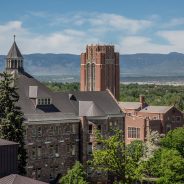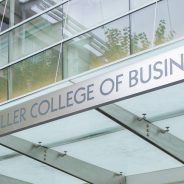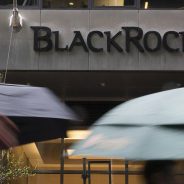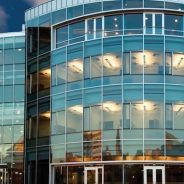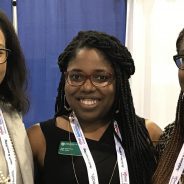Search results for career:
Full-Time MBA
Daniels College of Business Full-Time MBA Program Structure
The full-time, 21-month University of Denver Daniels College of Business MBA begins in September of each year. Both years of the program are comprised of five five-week modules over the course of the fall, winter, and spring. The first year is a mixture of required core courses as well as four “core business challenges”, real-world case studies and challenges undertaken with a small student team and a faculty advisor. The second year consists of remaining core courses, electives, one core business challenge, and “Launch”, the final module before graduation that focuses on career preparation, skill review, and achievement of personal and professional goals.
Curriculum
At the heart of the Daniels full-time MBA is real-world application: four core business challenges called the Enterprise Challenge, the Social Good Challenge, the Corporate Challenge, and the Global Challenge. The first three challenges take place in the first year of study, occurring simultaneously with core classes. Daniels focuses on the idea of students taking classes in the morning and then working on their challenges in the afternoon as a means of constantly applying classroom knowledge to real-life situations as it is acquired.
Students begin with the Enterprise Challenge, in which they work on small teams to create their own start-up company. Following the Enterprise Challenge is the Social Good Challenge, which allows students to partner with a local business to demonstrate noticeable social impact within the community. Next is the Corporate Challenge, a corporate partnership that lets students solve real-world business problems in the current environment. In the second year, students complete the Global Challenge, an international experience that gives students a taste of the global business world and the challenges it faces.
After a first year comprised of three business challenges, fourteen core courses, and two electives, students will spend the summer completing a mandatory internship. In the second year of the MBA, students then take four of their six mandatory electives. Four of these six total electives comprise a concentration, and students can choose between accounting, business analytics, finance, marketing, real estate and the built environment, or a custom option. At the end of the second year, students complete “Launch”—a comprehensive final module designed to prepare students to transition into their next career steps. Launch is also known as a “Lifelong Learning Lab” and provides an academic wrap-up and refresher while also completing a final check of Daniels’ “Personal Growth Agenda,” the individualized learning plan each student strives to complete over the 21-month program.
Full-Time MBA Rankings
• U.S. News & World Report: 80 (tie)
Class Profile
The average GPA of the incoming full-time MBA class is 3.36 and the average GMAT is 612. The program is comprised of 45 percent women and 8 percent international students, allowing a high level of diversity. As with other leading MBA programs, the average age at matriculation is 29 and students have an average of five years of prior work experience.
Careers
The Daniels College of Business hails its career preparation as one of the most distinctive features of the MBA program. Taking a fully integrative approach, students begin thinking about their professional development from the moment they step foot on campus. Utilizing an ongoing 360 review process, individual advising, online resources, mentorship programs, and a plethora of networking opportunities, Daniels Career Services ensures comprehensive preparation for each student entering the post-graduate school employment force. The continual self-assessment allows students to grow and adapt to their changing goals throughout the course of the program.
Tuition, Scholarships, & Financial Aid
The total assessed tuition for the entirety of the 21-month program is $96,000. Daniels notes that over 80 percent of students receive some form of scholarship award, ranging all the way to full tuition.
There is no additional application required to be considered for these scholarship awards, rather, the admissions committee considers academic merit, test scores, professional experience, and essays and interviews when making scholarship decisions.
Additionally, students are also eligible for need-based scholarships, which range from $1,500—$6,000 per year; as well as federal loans.
Admissions
A completed application to the Daniels College of Business requires official or unofficial transcripts from all institutions attended, a GMAT or GRE score, two mandatory essays and one optional essay, proof of at least two years of work experience, a professional résumé, TOEFL or IELTS scores if applicable, and a $100 application fee. The school offers an exception to the application fee for any DU graduates, and any current or former member of the U.S. military, Peace Corps, AmeriCorps, or Teach for America.
Interviews are offered by invitation only and are conducted either in-person or via Skype. After submitting a completed application, a member of the admissions committee will contact students if they are selected to interview.
Application deadlines are as follows:
While there are four rounds of admissions, the school recommends students apply as early as possible.
Deadlines for Spring Quarter 2022
Spring Quarter 2022 is currently open for eligible programs.
Round 1—October 15, 2021
Round 2—December 5, 2021
Final—January 15, 2022
Applicants will be considered on the basis of available seats through March 15, 2022.
Deadlines for Fall Quarter 2022
Priority—October 15, 2021
Round 1—January 15, 2022
Round 2—March 15, 2022
Final—May 1, 2022
Georgia Tech Scheller EMBA Ranked Among Best in the Country
The most recent rankings from the Financial Times places Georgia Institute of Technology Scheller College of Business‘ Executive MBA program among the best in the U.S.
Each year, The Financial Times compiles a list of the top 100 Executive MBA programs throughout the country, evaluating each program on a number of important features. Among the top business news organizations in the world, Financial Times determined their ranking through alumni surveys that looked at factors such as career progression, international reach, salary growth, and faculty credentials.
“I am pleased that the Financial Times has recognized Scheller College EMBA program’s commitment to our students and their achievements,” Scheller Dean Maryam Alavi said of the ranking. “The EMBA program excels in developing business leaders who are innovative, entrepreneurially minded, analytically skilled and who succeed at the intersection of business and technology.”
In the 2017 ranking, the Scheller EMBA was recognized as the top Executive MBA program in Georgia and the 15th best program in the United States. For facilitating career progress, the program was named second best in the U.S. and seventh best throughout the world.
The EMBA program at Scheller is nationally recognized for its career development program, which offers 1:1 coaching and advising, as well as providing many opportunities for executive networking and development workshops. The program, which takes 17-months to complete, offers specializations in the fields of Global Business and Management Technology. The program is offered exclusively on weekends, allowing up-and-coming professionals to continue their careers while earning their degree.
MBA Job Opportunities: BlackRock
Though many MBA grads are passionate about their career prospects, those driven to work in the financial industry may be more reticent to commit to a life of uncomfortable suits and harsh fluorescent lights. A TINYpulse study found that employees at financial service companies have some of the lowest career satisfaction rates out there, despite stable salaries. The study put the amount of financial service employees who are happy with their work environment at less than 22 percent. In fact, an eFinancialCareers study found that one third of bankers hate their jobs. So, does an MBA and a penchant for finance mean a life of tolerating punishing work hours with little recognition from colleagues and superiors? Not necessarily.
Recent MBA grads with a penchant for finance will be pleased to learn that BlackRock, Inc., one of the largest asset-management companies in the world, provides a different kind of environment from the majority of financial institutions. Business Insider consistently ranks BlackRock as one of the premier financial employers in the U.S, writing, “The firm is big on employee development plans and employee engagement. For example, employees get to pitch ideas to senior executives at the two-day Innovation Summit, which helps spur new products for retirees and connect coworkers across different departments, according to LinkedIn.”
Why Work at BlackRock?
In a Business Insider interview, Jeff Smith, Senior Managing Director at BackRock’s Head of Global Human Resources Group, called BlackRock, “… an incredibly passionate place with a very clear sense of purpose that comes from Larry Fink, our founder and CEO, to everyone else in the company.”
BlackRock is renowned for its relaxed corporate culture, and 73 percent of its employees report high job satisfaction. The company employs over 130 investment teams in 30 different countries, so there is ample opportunity to join BlackRock beyond its New York City headquarters.
BlackRock’s effort to create a successful and diverse environment has been nothing short of empowering. Since 2015, over 2000 of the company’s prominent employers joined in the “Driving Better Decisions” initiative, which aims to help remove “unconscious bias” in decision-making, according to the official BlackRock website, as well as rethink the way human resources recruits and develops diverse talent. While the gender ratio at the company is still predominantly male, BlackRock has also made a concerted effort to increase female employment in senior management roles to 30 percent by the end of the decade, signing the HM Treasury’s Women in Finance Charter.
Pay Day
According to recent PayScale survey figures, MBA grads, despite their role, earn around $86,000 annually at BlackRock. These figures fluctuate depending on the specific role, rising to as much as $316,000 per year for investment strategists. According to the same data, bonuses at the company are also pretty exceptional. Portfolio managers reported an average bonus of $39,000 per year, while even the lowest bonus figures neared $10,000 per year.
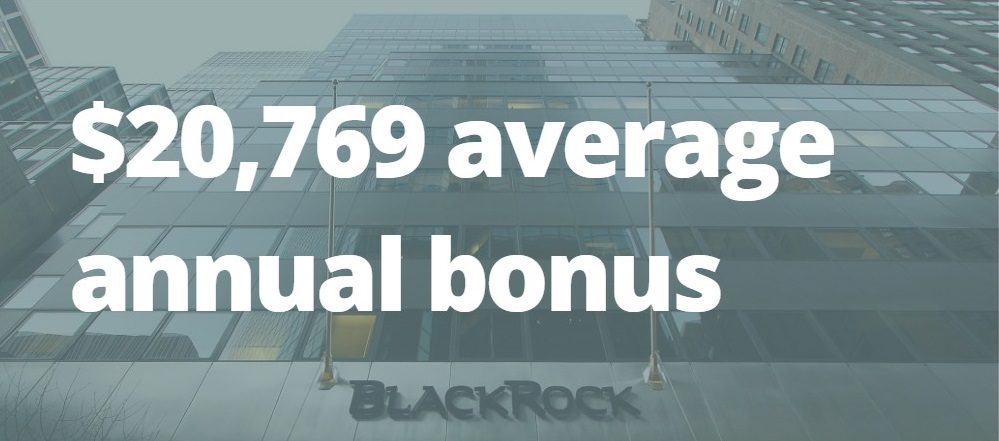
Figures according to PayScale data.
Interning at BlackRock
For students nearing the end of their higher education journey, BlackRock offers summer internships for a glimpse of life at the company. BlackRock’s global Analyst Program is a two year-long entry level program for new graduates. The program kicks off with a training in New York City. Throughout the program, trainees will develop their skills in communicating with clients and understanding how to help them manage fiduciary matters.
BlackRock offers several other internships, and is conscious of promoting diversity in their industry. The Founders Scholarship provides merit rewards and a summer internship to students who identify as Black, Hispanic, Native American, LGBTQ, or disabled. Merit awards for this scholarship can be as high as $15,000.
Getting Hired
In an interview with eFinancialCareers, Jonathan Jones, director of global campus recruiting at BlackRock, gave some insight into how interested candidates can get their foot in the door at the company.
“What I think makes a BlackRock person stand out though, is that we look for people who embody or represent our principles. For example, we have a commitment to innovation. Innovation—original thinking, problem solving, and creativity – is central to our identity. Equally, we have a strong commitment to teamwork, and we look for people who can join the dots between our disparate activities in ways which can solve problems for our clients,” Jones said.
According to Jones, BlackRock hires many recent university graduates with Bachelor’s degrees, and the company also hires MBA candidates who have work experience that is relevant to specific positions, such as real estate and equity research.
A recent highlight from Clear Admit on the best business school’s for MBA grads that want to break into the industry that these five schools produced the most finance employees:
- Columbia Business School
- University of Chicago Booth School of Business
- New York University Stern School of Business
- University of Pennsylvania’s Wharton School
- Cornell Johnson Graduate School of Management
BlackRock has been actively recruiting at the world’s high ranking universities, stopping by Columbia Business School as recently as last month for an information session. Read here to find out for more events the company is hosting in the coming weeks and months and check out more about a potential career with BlackRock below.
McMaster Nobel Laureate Myron Scholes Shares Insight with Students
The DeGroote School of Business at McMaster Unviersity recently hosted Myron Scholes, a McMaster graduate and nobel laureate who has built a career on the unknown.
Philadelphia or Boston? Where’s the Best Place to Earn a Part-Time MBA
If you are interested in pursuing a degree in a diverse East Coast city, want to be surrounded by history and culture, and still immerse yourself in growing business community, two main cities come to mind: Philadelphia and Boston.
Both cities are at the center of U.S. history, and continue to be some of its largest centers of commerce and academia, with numerous opportunities to put its stellar education to work.
Surrounded by so many possibilities for professional development, an MBA student in a city like Philadelphia or Boston may not want to put their career and income on hold to pursue a full-time degree.
Thankfully, many of the business schools in Philadelphia and Boston offer part-time MBA programs, allowing students more flexibility as they kick off their careers in these exciting cities. But how to decide which one? We’ll take a look at some of the top part-time MBA programs in each metro to help you choose the right city for you.
Location
Once the capital of the United States, Philadelphia has never stopped being a center of both business and history since the time it played host to the country’s founding fathers. Home to some of the oldest and best universities in the country, Philadelphia has experienced a renaissance in recent years as young talent has become priced out of more expensive metros like New York City and Washington DC. The cost of living in Philadelphia remains fairly low, while the ever-growing business scene in the city offers the opportunity for high earning potential. This year, 14 Philadelphia-area companies made the Fortune 500 list.
Like Philadelphia, Boston has been a center of commerce and trade since the days of the Boston Tea Party. Today, the city is home to nine Fortune 500 companies, including major established firms like GE (13th on the Fortune 500 list) and newer but thriving businesses like Wayfair. However, Boston has a much higher cost of living than Philadelphia. The city currently ranks as the third most expensive city in the country.
Programs
Between the Wharton School of Business and the Harvard Business School, Philadelphia and Boston offer two of the most highly regarded MBA programs in the country. However, both of these schools only offer full-time MBA programs. Students looking for more flexibility in their schedules still have a number of stellar programs to choose from.
Most of the part-time MBA programs in the Philadelphia metro work on a hybrid structure, allowing students to take a combination of classes both online and in person. Many programs also offer students the chance to select majors or concentrations in which to specialize their business education. With a variety of possible concentrations at some of the most highly-ranked part-time programs in the country, students from these programs have gone on to find employment at major firms like DuPont, KPMG, and JPMorgan Chase.
Part-Time MBA Programs in Philadelphia Include
- Lehigh University College of Business and Economics
- Fox School of Business – Temple University
- La Salle University
- LeBow College of Business – Drexel University
- Lerner College – University of Delaware
- Rohrer College of Business – Rowan University
- Rutgers School of Business, Camden
- Villanova School of Business
- West Chester University
Like Philadelphia, Boston’s part-time MBA programs offer more flexibility for students to complete their degree on their own time. Most courses are offered in the evening or on weekends, and can be taken over the course of just two years or up to seven. Programs like the MBA at D’Amore-McKim also give students the opportunity to concentrate in fields such as Corporate Finance, Corporate Renewal, Entrepreneurship, and more.
Part-Time MBA Programs in Boston Include
- Carroll School of Management – Boston College
- D’Amore-McKim School of Business – Northeastern University
- F.W. Olin Graduate School of Business – Babson College
- Questrom School of Business – Boston University
- Sawyer Business School – Suffolk University
- Simmons School of Management
Cost
The tuition costs can vary from program to program, and can also be cheaper if the part-time program is competed online. On average, programs in the Philadelphia metro area can range from $45,000-$65,000 for the degree. The range of costs in Boston can be slightly higher, with some students spending up to $95,000 over the course of their degree.
Jobs
Although the cost of an MBA in Boston may be slightly higher than Philadelphia, the difference in average salary between the two cities may even out concerns of cost. In Boston, the average salary for someone with an MBA degree in a field like finance is $112,000, whereas in Philadelphia it is only around $90,000 per year.
George Mason School of Business Welcomes New Dean Maury Peiperl
Maury Peiperl, Dean of the George Mason University School of Business since August, is quickly learning and already taking real steps to transform the institution.
PcW Brings Diversity Training Course to USC
Earlier this month, PricewaterhouseCoopers (PwC) conducted a diversity training course at the University of Southern California. According to a press release, the program was part of PwC’s recruiting efforts at the Marshall School of Business and Leventhal School of Accounting. Continue reading…
Oxford Saïd Dean, Together with Apple’s Tim Cook, Launches New Entrepreneurial Hub
Building on the success of Saïd Business School’s Oxford Launchpad and Skoll Centre for Social Entrepreneurship, Oxford University has launched a new entrepreneurial hub: the Oxford Foundry. Saïd Dean Peter Tufano and Apple CEO Tim Cook helped kick things off at an October 11 launch event.
The new student-led and student-centric hub will be open to all 23,000 Oxford students and is part of an effort to inspire campus-wide innovation. Its focus will be to help students develop their entrepreneurial skills as well as create and scale ventures.
The Oxford Foundry will welcome students from all academic disciplines, from engineering and medicine to history and business. The goal is to take these students from all different backgrounds and bring them together to learn from one another, generate new ideas, and tackle business and societal issues.
In particular, the new hub will support students in the three following ways:
- Community Building: The Oxford Foundry will draw inspirational and leading figures in the entrepreneurial world to speak to students and exchange ideas. It will also have a student advisory board and will partner with societies across the university including the 10,000-strong Oxford Entrepreneurs.
- Experiential Learning: The Oxford Foundry will host problem-solving competitions and workshops to help students put various skills and ideas to work.
- Start-Up Support: Each year, a select number of ventures will receive support including dedicated workspace, access to networks, and industry expertise to scale and start their ventures.
Oxford has a strong history of entrepreneurship and has produced more founders of “unicorn” businesses (worth $1 billion or more) than any other school in Europe. The new Oxford Foundry promises to only further strengthen this entrepreneurial community.

A look inside the new Oxford Hub.
“Entrepreneurship is of increasing importance to students. As a generation, millennials desire to be more socially responsible, innovative and to make an impact,” Oxford Foundry Director Ana Bakshi said in a university press release. “Whether starting their own ventures or aspiring to lead in organizations, the Oxford Foundry will develop students’ entrepreneurial skills, understanding, and self-efficacy. The aim is to create future leaders whatever career they pursue.”
The Oxford Foundry spans two floors in a renovated Victorian ice factory. It offers co-working space, presentation areas, a café, and incubator space for accelerating new ventures.
To learn more about the Oxford Foundry, visit the school website.
This article has been edited and republished with permissions from Clear Admit.
Full-Time MBA
University of Colorado Denver Business School Full-Time MBA Program Structure
Denver Business School’s 11-month, full-time MBA follows an accelerated schedule in order to pack in 45 credit hours’ worth of courses in less than a year. The program is divided into eight mini-terms of approximately five weeks each, as well as a mandatory International Business Abroad course in the month of March. The school follows a cohort structure in which every student takes the same classes with the same group of people in order to emphasize collaboration and teamwork.
Curriculum
Due to the rigorous accelerated schedule of the 11-month MBA, each student takes the same fixed courses. There are no core course waivers and no opportunity to choose individual elective options. Additionally, every student spends the month of March on an international trip, applying their learned skills to a practical business problem abroad. Classes meet four days a week, for two and a half hours in the morning and two and a half hours in the afternoon. Each and every course requires students to work with their cohort, and the school notes that it places a strong emphasis on this cohort structure so students can build lasting personal and professional relationships after their year-long program concludes.
Class Profile
Fifty percent of the most recent CU Denver Business School full-time MBA class identified as female, 50 percent male. Ten percent of the class was international and students in the program were, on average, 30-years old.
Career Statistics
Each student is assigned a dedicated career advisor at the beginning of their first year. Denver Business School notes that the advisors are there to guide each student through the process of finding employment and that 85 percent of employers in the U.S. plan to hire MBA graduates. In addition, the school offers workshops throughout the duration of the 11-month program. Workshop topics include Targeted Networking, Negotiating Offers, Identifying & Articulating Your Skills, and many more. The median starting salary of recent graduates was $77,250. Eighty percent of students reported being employed within 3 months of graduating.
The school takes advantage of its prime location in the heart of downtown Denver, just blocks from hundreds of thriving businesses. The Speaker Series brings industry professionals to campus to discuss industry-specific expertise, while business collaborations allow students to partner with local businesses to complete projects and practice solving real-world, current issues in their own city. Upon graduating, Denver Business School sees its students go on to hold positions in a variety of different industries, nearly evenly spread through sales & marketing, finance & accounting, information technology, startups & entrepreneurship, consulting, and nonprofit work.
Tuition, Scholarships, and Financial Aid
Tuition for the CU Denver full-time MBA program is $45,000, regardless of whether students are in-state or out-of-state residents.
The university offers the 11-Month MBA Award, designed for students with excellent academic standing and who demonstrate both professional and academic potential. This award can range from $1,000-$8,000. Additionally, the business school offers other merit scholarships, as well as public and private loans.
Admissions
Applicants to Denver Business School must submit a completed online application form, GMAT scores with a minimum of a 500, official transcripts from all institutions attended, a professional résumé, personal essays, two letters of recommendation, an application fee ($50 for domestic applicants, $75 for international applicants) and a TOEFL or IELTS, if applicable, for non-native English speaking students or students that have not earned an undergraduate degree from an English-speaking university. Personal interviews may be required of applicants, and the admissions staff will contact students if they are selected for an interview.
Application deadlines are as followings, opening every September for the following fall enrollment period:
- Round One: December 15
- Round Two: February 15
- Round Three: April 15
- International student final deadline: May 15
- Final Round for domestic students: May 31
Stanford Hosts Future of Work Symposium
The recent Stanford “Future of Work” symposium, co-presented by Stanford Career Education and OZY EDU, explored a number of topics related to a changing labor force in the face of automation, and what a more expansive definition of continuing education might entail.
Coursera CEO Jeff Maggioncalda SGSB ’96 and one of the panelists, believes that college degrees “will remain useful to build fundamental skills,” but that even college-educated members of the labor force “will be expected to continue their education throughout their careers” in order to stay competitive.
This is especially true for graduates with humanities and social science degrees, whose knowledge, according to Stanford’s Senior Vice Provost for Education Harry Elam, Jr. remain crucially important to helping industry “understand biases in data, facilitate collaboration, bring insight, provide historical perspective, and humanize technology in a data-driven world.”
GSV Asset Management co-founder Michael Moe believes that humanities and social science graduates can help us augment “the three R’s” with “the four C’s”: critical thinking, communication, creativity, and cultural fluency.
MindSumo co-founder and current Stanford GSB student Trent Hazy believes people with humanities and social science can “easily develop transferable skills that employers value. Humanities majors who also learn some quantitative skills by taking classes in statistics or logic will have an advantage over those who don’t.”
Coursera VP and Stanford GSB ’10 grad Julia Stiglitz believes startups like hers open up “educational opportunities … to anyone who has the will and desire and ability to go through it, and as a result I think we’re going to see all sorts of new people come into fields they otherwise wouldn’t have access to.”
When it comes to the projected 2030 obsolescence of half of today’s jobs by automation, all the speakers firmly believed that technology will create “new economic opportunity” in the long-term. Moe concludes: “While automation eats jobs, it doesn’t eat work.”
What Georgetown McDonough MBA Students Learn Outside the Classroom
What do Colin Powell, an Indiana dairy farm, the DC Department of Public Works, and a triathalon have in common? They are all part of the fabric that comprises life outside of the classroom for MBA students at Georgetown University’s McDonough School of Business. Sure, it makes sense to judge a business school on what takes place inside the classroom. But in skimming three seemingly unrelated recent news briefs from the school, we realized that taken together they help paint a picture of what life outside the classroom can look like.
Former Secretary of State Colin Powell Speaks
In September, the former U.S. Secretary of State and Chairman of the Joint Chiefs of Staff Colin Powell visited Georgetown McDonough to speak on the subject of leadership. He discussed his former military and government experience, as well as a turning point in his career: earning his MBA. The event was part of the Stanton Distinguished Leaders Series and was hosted by the McDonough Military Association, an MBA student club for military veterans.
Faculty, staff, alumni, and students were all invited to observe the conversation, which began with Powell touching on his MBA education. He shared with attendees about how his MBA—which he earned from George Washington University in 1971—enabled him to focus “on the more human elements of leadership,” explained the McDonough press release. He also talked about how he improved his management and leadership skills by gaining a better understanding of basic human psychology.
Powell then went on to speak about his career. He shared his experience of being pulled in a variety of different directions, including public service positions, telling audience members: “You serve where you are needed. This is what service is all about.”
Then, he went on to highlight what he views as essential components of effective leadership, namely helping others, stressing the human element of an organization, and building trust. He explained that he never tried to be an authority but to influence others, stating “leadership and followership are completely enmeshed.”
Finally, he touched on the importance of diversity. “We are a vibrant economy because of immigration,” he said. “We shouldn’t demonize anyone.” He talked about how diversity is important for leadership and for building a stronger America. The event ended with questions from audience members and drew praise from many in attendance.
As Prashant Malaviya, an Associate Professor of Marketing at McDonough, said on Twitter: “Honor and privilege to welcome Colin Powel to Georgetown McDonough. Amazing talk! Thank you!”
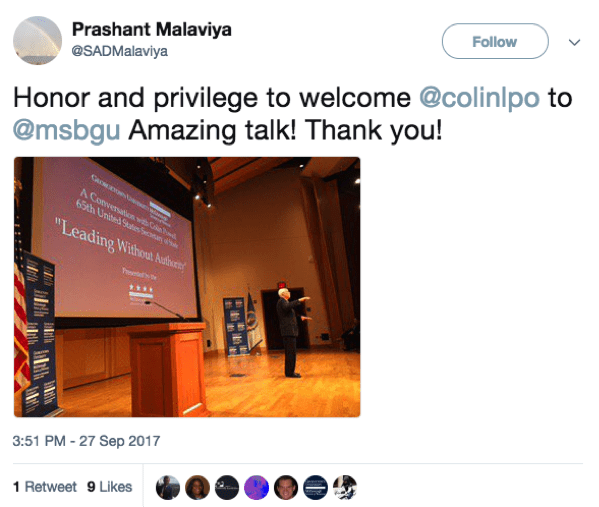
Hands-On Experience
Outside of learning from presentations and speakers, MBA students at McDonough also learn through hands-on opportunities such as a recent visit to Fair Oaks Farms, a sustainable dairy farm in Indiana, as well as a summer internship with the DC Department of Public Works (DPW).
The farm visit, which included 18 MBA students, was part of the course “Principled Leadership in Business and Society” taught by Associate Professor Ed Soule.
The trip was designed to help students learn more about sustainable business by seeing it in practice. Fair Oaks Farm is the sixth largest dairy cooperative in the nation and an agri-tourism destination owned by Sue and Mike McCloskey. While visiting, MBA students were able to see how the farm employed various practices and technologies to minimize its environmental footprint while maximizing the comfort level of the cows.
“It’s one thing to read a case about a sustainable business, but seeing it and meeting the people adds another dimension,” Soule said in a news release about the trip. “The other objective of the trip was for them to interface casually with the McCloskeys, to pose questions, and get a more nuanced understanding of the business.”
Second-year MBA student Emma Loughman called the farm an “epicenter of innovation” and said she enjoyed learning about the difference between organic and sustainable farming.
As for the internship with the DC DPW, two students—Paul LaCorte (MBA ’18) and Leo Dzidziguri (MBA ’18)—participated in the trial program between the department and Georgetown McDonough. Over the course of the hands-on, three-month experience, the students responded to a request by the city administrator to evaluate two critical areas: light vehicle repair turnaround and citywide compliance and preventative maintenance.
The internship required data collection, analysis, visualization, process mapping, site visits, and audits. “We were involved in projects that required knowledge from multiple fields,” Dzidziguri said in a news release. “For example, I performed statistical analysis on several years of data to identify reasons why the Fleet Management division could not meet its key performance indicators, while at the same time studying the operations and recommending a new map for more efficient processes.”
Extracurricular Fun and Fitness
Finally, no MBA program is complete without a bit of friendly competition. Early in September, three Georgetown MBA students participated in the 12th Annual Nation’s Triathlon. Hall Wang (MBA ’19), Taylor DeVoe (Evening MBA ’20), and James Hesburgh (MBA ’19) signed up for a 1,500-meter swim, 26.2-mile bike ride, and 10k run relay—respectively. This was an opportunity for the MBA students to meet outside the classroom and campus to explore their common interests.
In a short news brief on the school website, Wang described the triathlon as a relationship-building experience. “I like to think we showed what the Georgetown MBA experience is all about,” he said. “Regardless of cohort or program, we build relationships and partake in our community, one fun adventure at a time. Ours just started with a really early alarm clock and ended with some sore body parts, but now we have an exciting story to tell.”
This article has been edited and republished with permissions from Clear Admit.
In Search of San Francisco’s Best Nonprofit MBA Programs
Even though San Francisco may be thought of as the place to be for entrepreneurship and technology, the city is home to a diverse community of organizations both private and public, both for and not-for-profit.
Business professionals in the city can apply their business acumen and education in a number of ways, whether helping a new venture get on its feet, contributing to some of the largest tech firms in the world, or supporting a mission they’re passionate about. And though such mission-driven organizations center around the cause and not of profit-making, having a strong business leader at the helm is crucial in helping these organizations to achieve their mission.
Students interested in gaining critical operations and management skills to apply in the nonprofit sector may be interested in pursuing an MBA in Nonprofit Management. Professionals with this degree have moved on into major leadership roles in the nonprofit field, whether working as a Nonprofit Program Director, Development Director, or Community Outreach Coordinator. Nonprofit managers are able to flex their muscles in finance, marketing and a number of other areas of business while still focusing their passion on a broader mission of change or aide.
A few business schools in the San Francisco metro area offer the chance for students to focus their MBA in the field of Nonprofit Management, offering a diverse skill set of nonprofit experience combined with a strong business foundation. Below, you can explore the San Francisco MBAs in Nonprofit Management.
San Francisco Nonprofit MBA Programs You Need To Know
Haas School of Business – UC Berkeley
The Haas School of Business at UC Berkeley offers an MBA concentration in Social Sector Leadership through the university’s Center for Social Sector Leadership. Ranked second overall among business schools with a nonprofit focus by U.S. News & World Report, the Haas program trains up-and-coming business leaders to make a social impact and inspire collaboration between sectors.
The Center for Social Sector Leadership offers students a wide variety of courses to take that can help shape various careers in the social sector, such as nonprofit consulting, board leadership, and strategic or financial nonprofit management. In addition to learning inside the classroom, the center also provides a number of opportunities for experiential learning, such as the Berkeley Board Fellows, which places graduate students on nonprofit boards of directors, or the Haas Impact Investing Network, which offers first-hand experience in impact investing for socially-minded MBAs around the country.
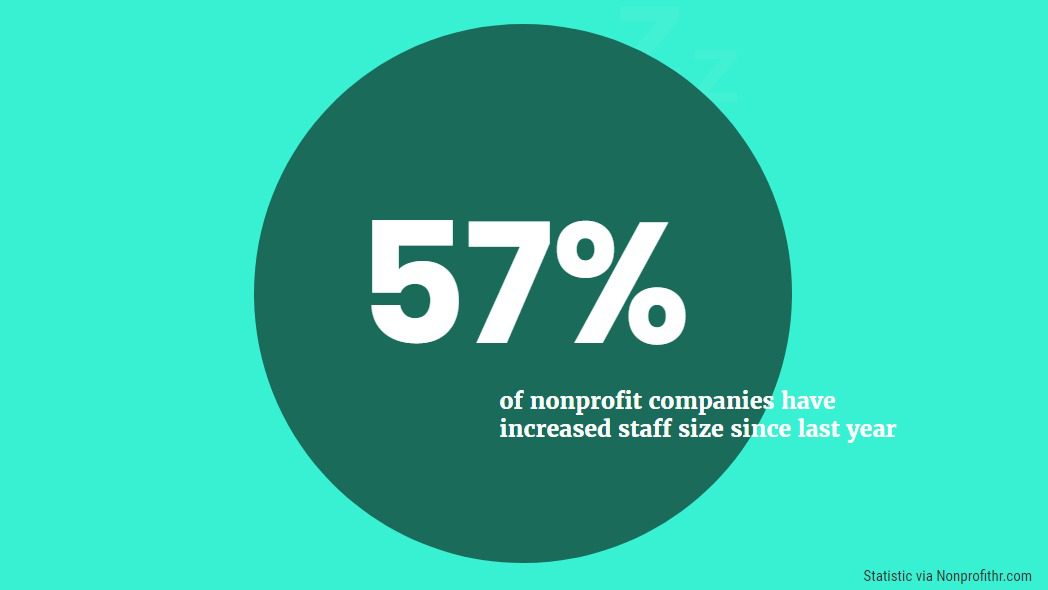
San Francisco State University College of Business
The College of Business at San Francisco State University offers at MBA Emphasis on Nonprofit and Social Enterprise Leadership. With the goal of preparing students to take their business skills to mission-driven organizations, the program will teach students to create a coherent organizational vision, apply innovative solutions to address needs, and evaluate the effectiveness of an organization’s programs in meeting goals.
Students in the Nonprofit and Social Enterprise Leadership emphasis will take the core MBA course requirements as well as three courses for their major: Nonprofits, Policy and Society; Innovation for Sustainability; and Seminar in Social Entrepreneurship, or Strategies in Emerging and Developing Economies. Students will also select two electives that can help further shape their education in leadership and creativity.
Stanford University Graduate School of Business
The Stanford Graduate School of Business offers MBA students the opportunity to pursue a Certificate in Public Management and Social Innovation as part of their degree. Through the university’s Center for Social Innovation, MBA students can explore the social sector and prepare for roles as forces for social change throughout the nonprofit, philanthropic, government, or corporate spheres.
To pursue the certificate, MBA students must complete a social innovation experience that allows them exposure to populations affected by a particular social or environmental issue. Students may also work alongside leaders making contributions in the field to fulfill the requirement.
For more on how MBAs are making a greater social impact, check out how these students are making a difference in their own unique way.
Full-Time MBA
Leeds School of Business Full-Time MBA Program Structure
The full-time, 20-month Leeds School of Business MBA places emphasis on a holistic learning experience, providing students with co-curricular activities and events to complement the in-class curriculum. The school strongly encourages students customize their MBA by building expertise in one of four functional areas: finance, marketing, real estate, or sustainability. Furthermore, students can combine their functional focus with a specialty in either entrepreneurship, real estate, or sustainability.
Curriculum
Full-time MBA students must complete 55 credits to graduate. The first year of the MBA program consists of primarily core courses, the majority of which only take a half-semester to complete, while courses like Socially Responsible Enterprise or Decision Modeling last an entire semester. In the second semester of the first year, students will complete two elective courses, followed by a second year made up of solely electives.
The Leeds curriculum is designed to allow students the flexibility to craft a personalized plan according to specific professional goals. The school encourages functional areas of focus in four different areas, as well as specialties in three additional areas. This highly customizable program enhances a student’s chances of finding a career in whatever path they choose, given the relevant prior coursework and experience.
Full-Time MBA Rankings
• U.S. News & World Report: 70
• Bloomberg: 67
• Forbes: 60
Class Profile
The most recent Leeds’ full-time MBA class features 102 students, with an average undergraduate GPA of 3.32 and a GMAT of 610. The class, on average, is 29-years old and comprised of 33 percent female students.
Careers
The MBA Programs office serves as Leeds’s career support advisors. The office offers personalized career advising, one-on-one mentoring with an experienced professional in a student’s interested field, and several events including networking, club, and social gatherings, as well as industry panel discussions. The career advisors begin working with students at orientation and continue their guidance throughout the entire MBA program. The school boasts its Professional Mentoring Program, in which a variety of industry professionals provide hands-on learning, relevant advising, networking aid, and skill development to a full-time MBA student. The program has seen such success that the number of participants has doubled in size since its inception in 2009.
Tuition, Scholarships, and Financial Aid
Tuition and fees for the Leeds full-time MBA is $55,862 for Colorado residents and $67,517 for out-of-state residents. The school notes that second year students will qualify for in-state tuition rates in their second year of study after establishing a year of Colorado residency.
All Leeds applicants are automatically considered for merit-based fellowships, and also have the opportunity to apply for additional fellowships online. Leeds also offers federal loans, as well as private loan options.
Admissions
In order to apply to the Leeds School of Business, applicants must provide an online admissions form, unofficial transcripts from all institutions attended, GMAT or GRE scores (though the school notes the GMAT is preferred), two letters of professional recommendation, three required essays, and a $70 application fee. International students must submit official scores proving English proficiency–either the TOEFL, IELTS, or the PTE exam.
Interviews are conducted on an invitation-only basis, and are conducted either in-person, over the phone, or through Skype.
Application deadlines are as follows:
| Stage | Application deadline | Decision by |
| 1 | Thursday 16 December 2021 | Monday 14 February 2022 |
| 2 | Tuesday 1 March 2022 | Wednesday 13 April 2022 |
| 3 | Friday 22 April 2022 | Friday 20 May 2022 |
| 4 | Final international deadline: Thursday 30 June 2022 | Final international places awarded: Friday15 July 2022 |
| 5 | Final UK deadline: Friday 19 August 2022 | Final UK places awarded: Friday 26 August 2022 |
Return on Investment: Getting Your Money’s Worth in Washington DC
Earning an MBA is a big commitment in terms of both time and financial resources. Attending school in Washington, D.C. will open students up to a wealth of job and internship opportunities. However, with the cost of living and education in the financial capitals of the US rising at an alarming rate, choosing a school that will leave you with the smallest debt for the best job prospects is paramount to not being saddled with debt for the next 30 years of your life.
Though a price can’t be put on the value of the stellar education and business acumen you’re sure to get in business school, we can certainly try. Below, we’ve worked out the schools that guarantee the best return on investment in Washington DC metro.
Washington DC MBAs That Offer the Best Return on Investment
University of Maryland R.H. Smith School of Business
At the University of Maryland’s R.H. Smith School of Business, students can earn their degree just eight miles from the White House. Tuition at UMD Smith comes to about $47,004 for in-state residents per year and $56,184 for those from out-of-state. Though the business school’s MBA program may not be considered “cheap,” the average starting salary for MBA’s from the class of 2016 was $95,600—nearly double the annual tuition cost for both in and out-of-state students. This incredibly high average starting salary makes Smith well worth the price. In the past, Smith alumni have landed internships and full-time positions at companies like Amazon, Marriott, and Google. Thus far, majority of Smith MBA grads have gone on to pursue careers in marketing or consulting.
According to the recently released Forbes list of the best MBA programs in the U.S., UMD Smith (46th overall) MBA grads now expect a net-gain of $45,000 five years after graduation, when taking into account the average salary increase, cost of the program, and more.
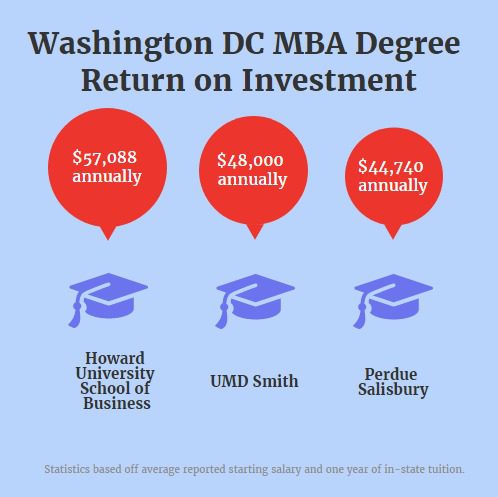
Perdue School of Business—Salisbury University
Though it is closer to Baltimore than DC, Perdue School of Business MBA students are sure to see a significant return on investment for their education. The tuition is only about about $11,760 for in-state residents and $23,850 for out-of-state applicants. Not to mention the average alumni salary is $56,500, which essentially means the average alum sees a significant return on investment in less than a year. The year-long program is delivered in a hybrid format, so students only need to meet on campus one night per week. Students looking for even greater flexibility can also choose to take 100 percent of courses online. Additionally, students who wish to move at a slower pace can take classes part time and choose their own schedules.
Howard University School of Business
The Howard University School of Business MBA program was the first DC university to earn AACSB International accreditation. Annual tuition for the full-time MBA program per year is a reported $33,996. The total for the two-year program comes to around $70,968. Considering U.S. News puts the average MBA starting salary at $91,084, the return on investment is undeniable. Howard also offers a variety of dual degree programs, including JD/MBA, MD/MBA, BSE/MBA, and more. One unique feature of Howard is its Global Trilateral MBA (GTMBA), which gives students international consulting experience in places like China and South Africa.
Georgetown McDonough Student Government Association Launches Research Bites Series
For those wondering why speaking events don’t serve more food, you aren’t alone. At least, it seems the McDonough School of Business Student Government Association (SGA) picked up the idea, launching the Research Bites “lunch-and-learn” series late last month.
The series, running until November 20, and highlights faculty research over five unique events. During each Research Bites session, a different faculty member will give a one-hour presentation about their life in academia and how their research impacts business. Gabe Nelson, MBA ’18, Vice President of curriculum for the SGA, wanted to recruit faculty members who were familiar to the student body. He reached out to professors who taught core classes and had interesting research experiences to drum up interest. Nelson says he hopes the series will “give students valuable insights that can help their careers in tangible ways” and “build faculty-student relationships.”
The first Research Bite took place on September 18 and featured Associate Professor of Strategy Chris Rider. He expanded on the effectiveness of the NFL’s Rooney Rule, which is the league policy that requires all teams to interview minority candidates for head coaching positions. According to the press release, about 50 students attended the first event.
Other faculty members set to participate in the series include:
- Debora Thompson, Associate Professor of Marketing
- Paul Almeida, Dean and William R. Berkley Chair
- Jason Schloetzer, Associate Professor of Accounting
- Allison Koester, Assistant Professor of Accounting
According to McDonough, the MBA SGA serves the student body of Georgetown’s MBA program and is the primary interface between the student body and the faculty and administration. The SGA plans social events and boosts alumni relations, such as Thursday kegs, outings to local sporting events, and fall and spring formals. The SGA is also responsible for major student organization decisions, management of finances, and implementation of new and existing policies or initiatives. You can learn more about the McDonough MBA Student Government Association here.
The Top 5 Reasons Diversity MBA Conferences Should Be on Your Recruiting Calendar
Pictured above: Tuck second-year MBA students Bianca Goins, Sadé Lawrence, and Jodine Gordon.
More than 10,000 MBA students, business school representatives, recruiters, and business executives filled the Pennsylvania Convention Center in Philadelphia late last month for one of the largest career conferences serving minority professionals. The conference has been around since 1970, but for the first time this year the National Black MBA Association (NBMBAA) and Prospanica, the association of Hispanic professionals, joined forces to present it. The result was an incredible opportunity for attendees to network with companies and each other, take advantage of career development programming, and interview for and secure job offers from hundreds of companies spanning multiple industries.
Cornell’s S.C. Johnson Graduate School of Management had a group of approximately 55 students attend, a mix of first-year and second-year students, according to Cynthia Saunders-Cheatham, Executive Director of Johnson’s Career Management Center.
“It was double what we have had in recent years, and perhaps the largest attendance we ever had for an MBA diversity conference,” she said. “Having a joint NBMBAA/Prospanica conference, in addition to the Philadelphia location that was driving distance away [from Ithaca, NY, where Johnson is located], helped to drive attendance.” The connections that students made while there have already resulted in multiple job offers, she added.
While securing a job or internship is a primary reason many MBA students choose to attend the National Black/Prospanica conference and others like it, that’s just one of many potential benefits events like this offer. Given that this most recent conference was right here in our hometown of Philadelphia, we went to check things out for ourselves. Through conversations with attendees, school representatives, and recruiters, we’ve compiled the following list of reasons why this year’s crop of applicants should be sure to add diversity MBA conferences to their recruiting calendar next summer and fall.
1. Unparalleled Recruiter Access—Including Many That Don’t Come to Campus
The Career Expo, which took place on the last two days of the five-day National Black/Prospanica conference, filled a cavernous hall in the Convention Center and included booths from close to 300 companies spanning dozens of industries. Among them were coveted post-MBA tech employers like Google and Amazon, consulting industry leaders including Bain & Company and Accenture, and financial services firms such as BlackRock, Bank of America, and Morgan Stanley. There was a continuous gaggle at the Google booth, and one of its MBA internship recruiters, Tanya Choudhury, had to resort to wearing a sign by the second day explaining that she’d lost her voice.
Big pharma and healthcare were also well represented, with booths attended by recruiting representatives from drug maker AstraZeneca to medical products and equipment company Zimmer Biomet and many in between. Leading consumer packaged goods (CPG) firms including PepsiCo, General Mills, and Proctor & Gamble were also there, as were oil and gas giants like BP, Chevron, and Exxon.
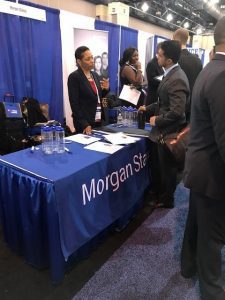
Morgan Stanley was one of almost 300 exibitors in the conference’s packed Career Expo.
But there were also plenty of organizations that are perhaps less top of mind as potential MBA recruiters—the Central Intelligence Agency, the U.S. Department of State, Teach for America, and USAID, for example—who were just as eager to share how highly they value the MBA skillset. Dozens of leading business schools also had booths, largely to provide support and serve as gathering places for students who were attending, but also with an eye out for promising diverse talent. For example, Roberto Martinez, a Senior Talent Acquisition Consultant for Dartmouth College—home to the Tuck School of Business—was eagerly distributing glossy handouts touting the school’s varied career opportunities, commitment to diverse hiring practices, and excellent benefits. “We’re here not only to support students but also to hire more diverse staff to campus,” he said.
For Tuck second-year MBA student Bianca Goins, the breadth of companies at the expo was a big part of the draw. “I wanted a diverse group of companies to look at in a single spot,” she said. “There are so many companies here, and as second-year you can really come and pick and choose the experiences you want to have.”
Tiffany Anderson, a second-year student at Emory’s Goizueta Business School, was also impressed by the sheer number of companies present. A self-proclaimed conference veteran, she also attended National Black last year, as well as conferences presented by the Forté Foundation, the Consortium for Graduate Study in Management, Management Leadership for Tomorrow, and JumpStart. “Out of all the diversity conferences, I would certainly say this is the flagship,” she said. “Wow! There are A LOT of companies here,” she recalled thinking to herself as she walked in. More so than last year, before National Black and Prospanica teamed up, she added.
“I have seen the most people—students from many different schools and recruiters from many different functional areas of interest,” she continued. “It seems to be the most diverse in terms of attendees, degree of programming, and companies in attendance. For the majority of people, this is going to be one of the best to attend.” Anderson estimates that there were probably 30 or so Goizueta students there, a mix of first- and second-years.
2. Multiple Touch Points and Opportunities for Face Time
For some students, certainly, the primary purpose in attending the conference is to land a job. Second-year IU Kelley School of Business MBA student Henrique Barbosa, a native of Brazil pursuing travel hospitality, had a simple answer when asked why he was there: “To get a job!” He acknowledged that most of the firms he was interested in only conduct first-round interviews at the conference followed by second-round interviews on site, which lessened the likelihood of his leaving with an offer in hand. “But it would be great if it happened,” he said.
But several other students were less interested in job or internship offers—or even in early round interviews. For Jodine Gordon (Tuck ’18), the biggest factor in her decision to attend was hearing success stories from Tuck grads whose higher-level touch points with conference recruiters later helped them secure offers. “I have a couple companies on my list, but really I just want to meet as many people as possible so they can get to know me and I can get face time,” she said.
Sadé Lawrence, also a second-year student at Tuck, was likewise attracted by the opportunity to get in front of recruiters in person. “For a lot of opportunities you might be interested in, you start online at a website, applying through data base,” she said. “But coming here they now have a face with your name, and there are all kinds of organic connections that can happen,” she added. “It’s kind of amazing that you are able to build connections with people even at such a big conference, but you are. You make contacts and get lots of face time—so much more so than you can blindly through a website,” she continued. “What I have heard more of is people have an interaction with a recruiter here that leads to an interview later—here is more about entering the pipeline.”
Tuck’s Goins has taken the opportunity to network with recruiters who don’t make it to Tuck’s campus, but also those who do. “With every interaction, you are getting a more nuanced understanding of the company and can take that information and use it in subsequent interactions.”
3. Valuable Chances to Network with Peers
Goizueta’s Anderson interned in operations at Google over the summer—an opportunity she got through another diversity conference—and has been offered a full-time position on the tech giant’s Mountain View campus after she graduates. Despite having that full-time offer in hand, attending the conference still made lots of sense.
Kelley School second-year student Luis Vilchez Kupres, a native of Peru, also converted his summer internship—in supply chain operations at Cummins—into a full-time offer. So his reasons for attending the conference were not to get a job. ”I am here to support fellow Kelley first- and second-years and network a little more,” he said. He also gets to reconvene with students from other schools he met at last year’s Prospanica conference. “Often, you connect with somebody and they will help you connect with someone else,” he said. “Networking definitely helps—even among other MBA students.”
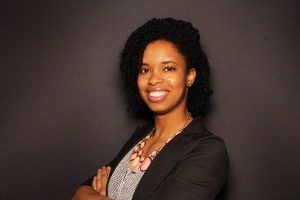
Tiffany Anderson, Goizueta MBA ’18, a diversity MBA conference veteran
For the Google-bound Anderson, the value of peer networking can’t be stressed enough. Being able to connect with students from other schools is the part she finds most enjoyable—but it’s also strategic. “When candidates are selecting a school they like to look at the size of the network they are going to get—and that’s great,” she said. “But the way I see it, I don’t have to be at Stanford or Wharton because I have friends at Stanford and Wharton. So in a way that’s kind of my network, too.”
“You have that domino effect,” she continued. If she’s trying to connect with someone at a company where she doesn’t have a contact or her classmates don’t have contacts, she can reach out to a friend at another school to see if there’s someone in their network. “Some might say, ‘Well, they’re a peer, they’re not an employer, they’re not going to get me a job.’ But there is so much more benefit to expanding your network. I don’t think everyone understands that.”
Of course, peer networking can be a two-way street. “My motivation to expand my network comes from wanting to help others as well,” Anderson said. “When you are part of these diversity networks, one of the great things is you are going to have a friend who says, ‘Do you know someone who can help me with this?’ And I can say, ‘Well, I met someone at a conference who does that very thing and I’m happy to put y’all in touch.’”
Your Search for Atlanta’s Best Accelerated MBA Programs
Most folks pursuing an accelerated MBA know which industry or area of concentration they want to pursue. They are MBA candidates who want to advance their current careers, not switch them. Others choose the accelerated route because it can be difficult to leave two years of work and salary. Continue reading…
London Business School Still Hotspot for International Students
London is a key destination for people abroad, especially for its business schools.
The London Business School is still attractive for international students, a press release reads. The incoming 2019 class will be 91 percent international—even with the drama and controversy following the Brexit decision. It seems that this move might actually be helping the school attract more students.
“Students coming here have seen increased purchasing power (due to the fall in the pound), while LBS has succeeded in hiring excellent faculty for the 2017–18 school year,” Professor of Management Practice in Accounting Andrew Likierman said.
The 2019 cohort is made up of 432 students with just 39 percent women. They come from 62 different countries and are around 29-years old. They’ll likely see the success. Ninety-four percent of last year’s students had found a job within three months of graduation. One of the students joining the school is 2019 is Sherry Stolar.
“I’ve lived in London twice before, and there’s no other place in the world with such diversity,” she said. “LBS’s class reflects that, with students from 70 countries and from diverse backgrounds.”
Stolar values having global peers. After all, the business world operates out of a global market. Meeting people from around different corners of the world certainly doesn’t hurt her—or any other student’s—chances at making it in business.
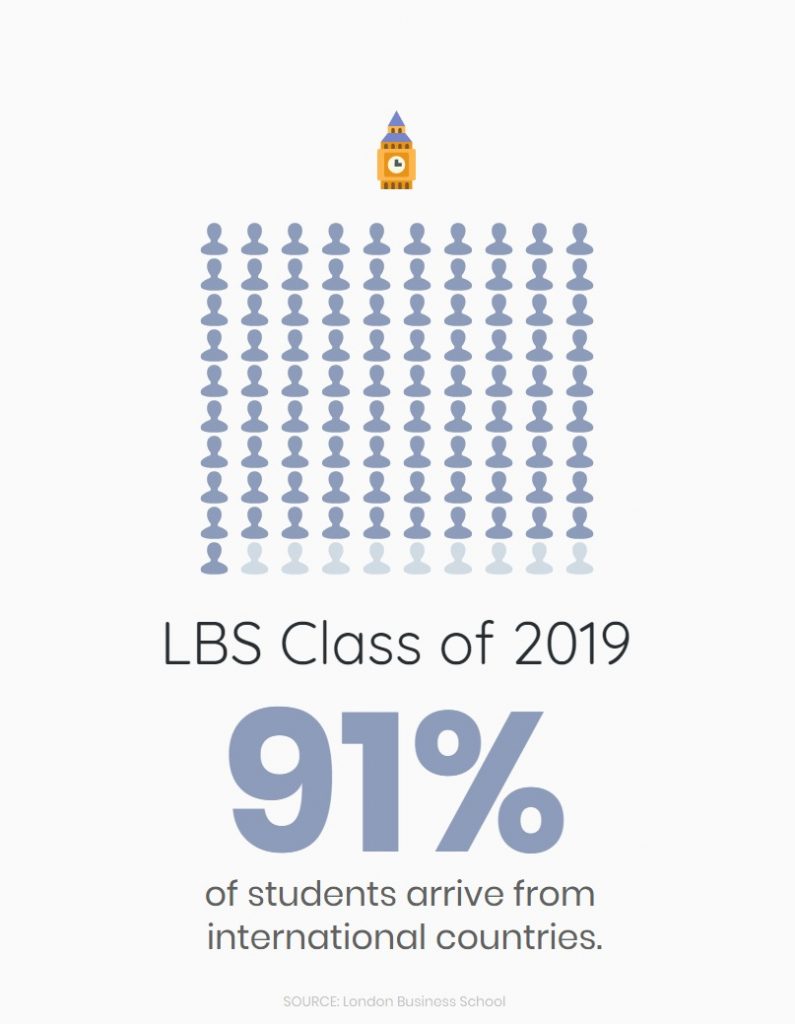
Forbes gave the business school the best international ranking, so it’s likely to keep seeing more students from outside the country. Its MBA programs include a full-time, executive, and several masters programs. For student Amanda Morgan, there’s nowhere else she’d rather be. The school’s international student body is what she wants to further her career.
“Diversity is important because a large part of what you learn on an MBA is from your peers,” Morgan said. “Students and faculty at LBS offer a vast range of perspectives from which I can learn and later apply in a consciously global context.”

